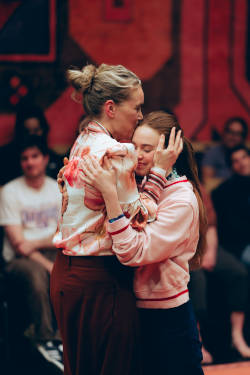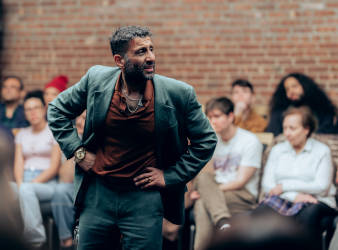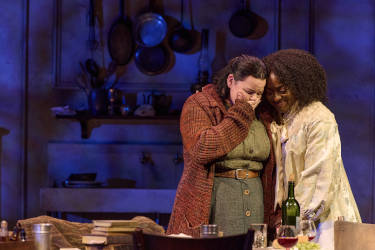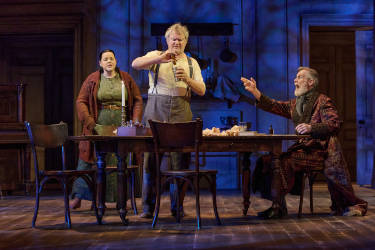
Dorothy
Chansky
|
Chekhov in Brooklyn and Washington St. Ann’s Warehouse Shakespeare Theatre Company “Rich or poor,” goes a family adage, “it’s nice to have money.” This could be the watchword for virtually all the characters in “Uncle Vanya” and “The Cherry Orchard,” two reliably malleable staples in the oeuvre of Anton Chekhov. Chekhov is thriving in the world of re-imagined classics, enjoying a deserved place beside Shakespeare, Euripides, Sophocles, Aeschylus, Aristophanes, and Molière. No more obligatory black dresses, overflowing samovars, lugubrious hand-wringing (maybe a little), fussy gardens, or fusty translations. Gone are the days of needing to look up or Google “boiled sweets” or “accoucheur.”
Both plays are set on estates belonging to one-time wealthy families riddled with debt, unable to move on from the habits of their privileged past, yet charming and very good to the servants and hangers-on who depend on them and would never leave. Both productions here—the Donmar Warehouse “Orchard” in Brooklyn and a brand new “Vanya” in D.C.—have British directors, newly reworked scripts, and are performed in open playing areas with (re)moveable carpets and with actors in modern dress for at least part of the play. Both have gifted, agile, deeply invested casts and fluid staging. A spectator unfamiliar with either play would know exactly what is at stake and who’s who in both—at least after things settle down following the first five or so minutes. A spectator familiar with one or each play comes away knowing, feeling, and wondering about more than they imagined they knew before.
In the Shakespeare Company’s “Vanya,” Conor McPherson’s adaptation and Simon Godwin’s directing make lively but sympathetic sport of a world of people who are non-stop talkers, perpetually bored, and all disappointed in, but stuck with, their choices. It can take a short while to sort out who’s who, as the cast nearly all enter right at the start in modern dress, and it is not immediately clear whence they arrived nor why they are there. As the tensions become higher and the mire deepens over the course of the play, clothing becomes increasingly character and era specific (the late nineteenth century) and feelings of hopelessness more entrenched. The matriarch of the estate, Mariya Voinitskaya (played by Sharon Lockwood) fancies herself a feminist activist but mostly stays home reading pamphlets, fretting, and standing up for her deceased daughter’s widower, Professor Serebryakov (Tom Nelis), who is remarried to Elena, an indolent trophy wife (played by Ito Aghayere) and is basically holding the family and the estate hostage to his sense of entitlement. He is retired, pompous, non-productive, and a hypochondriac, but he expects the estate to provide him with an income so he can continue to live in the style to which he would like to remain accustomed in the city. His daughter, Sonya, should rightfully inherit the property, but instead she toils as a kind of administrator cum housekeeper to allow her father to continue his pomposity and selfishness while she and her uncle, the titular Vanya, exhaust themselves in service and get older, both spurned by the people who leave their love unrequited. For Vanya it is the beautiful Elena and for Sonya it is the area’s doctor, Astrov, who is disappointed in his lack of success at saving lives, is a treehugging cartographer, historian, and bicyclist, and who drinks huge amounts of vodka. He is also in love with Elena, who turns him down and whom he ultimately accuses of infecting everyone with her and her husband’s idleness. John Benjamin Hickey’s philosophical but crushed Astrov is both an energetic and idealistic activist and an unhappy bachelor feeling old before his time.
Hugh Bonneville as Vanya is masterfully playful and at the same time believably woeful. The character is a compendium of would’ve/should’ves, but he soldiers on. Bonneville’s athletic physicality coupled with a boyish naivete summon a response wonderfully balanced between sympathy and eyerolling. Melanie Fields’s Sonya radiates warmth, efficiency, empathy, and intelligence. The character is admired by all for her sweetness and capabilities, but she is a plain girl and knows she is unlikely to go anywhere other than back to working for her keep on the family estate until both she and her uncle are old. They must wait for the afterlife for any rest and joy. While the Professor’s parting shot is a bid for practicality, as he heads back to the city to continue his life of privilege provided by the labor of others, it is Sonya who in fact enacts practicality, even as she takes up that very labor.
While “Vanya”’s Professor suggests selling the Voinitsky estate, “The Cherry Orchard”’s nouveau-riche Lopakhin all but insists on the Andreevich family auctioning off their property, spelling out with clear arithmetic how only a sale of the eponymous trees will enable the family of wastrels who still own it to go on at all. Benedict Andrews both wrote and directed the new version of the play, which is spiked with contemporary usage (“on it,” “punch his lights out,” “I feel ya,” “don’t stress”), cross-gender and interracial casting, and British accents, managing with its in-the-round staging and contemporary dress to be illusionistic and Brechtian by turns and sometimes simultaneously. Characters materialize as actors enter the arena from seats in the audience area. Performances are emotionally grounded and sometimes larger-than life, but when scenes end and actors return to their seats, they sit quietly, neither in nor out of character, as the collectively told story continues to unfold. Nina Hoss is luminous as Mme. Ranevskaya, a forty-something widow who grew up on the estate and has, as her seventeen-year-old daughter, Anya (Sadie Soverall), says, “no concept of money.” What she doesn’t spend on gifts, restaurant meals, and parties, she gives to beggars, trusting that someone or something will rescue her from utter insolvency. Wisdom and sympathy bump up against sentimentality and nostalgia as Hoss makes us feel the unforgettable loss of the years-ago drowning of the character’s little boy as well as her romantic and needy yearning to return to Paris and the opportunistic boyfriend who has bankrupted her once and is likely to do so again. As engaging as Hoss is in a role that can sometimes make one feel that this woman just needs to grow up, she is matched by Adeel Akhtar as Lopakhin, the now-wealthy son and grandson of peasants who has never forgotten either his origins or Ranevskaya’s beauty and kindness to him when he was a teen slugged in the face by a drunken father. For one moment the two come together in a wholly unexpected kiss, but neither will jump class ship, so the encounter goes nowhere. Or at least nowhere direct. It is, of course, Lopakhin himself who purchases the cherry orchard at auction (nowadays it might be a tax sale) even as Mme. Ranevskaya expects a wealthy and distant aunt will bail her out. The party she throws on the night of the sale is not attended by anyone she invited, but the rock band hired for the occasion allows for various characters to step up to the mic and vent/express themselves before the moment of truth arrives. Lopakhin, giddy with success and increasingly intoxicated as he imbibes more and more champagne, has saved the family financially while bringing their cultural heritage and way of life to an end. The way of life to which they cling officially came to an end in 1861, when Russia’s twenty-thrill million serfs (slaves, really) were legally released from bondage by order of the Tsar. Both plays feature old characters who may officially be free citizens but who stay with the families and hierarchies with which they are familiar. In “The Cherry Orchard,” the eternal student Trofimov (former tutor of Ranevskaya’s drowned boy), voices the radical disdain for the privilege and complacency of which many of us are guilty. Played with a blend of passion and imperiousness by Daniel Monks, Trofimov calls for an end to “obscene inequality, the blatant abuse of power, the daily atrocities. It’s time we shed our sentimental illusions, drop the optimism bias, and confront these issues head-on, only then can we begin to shatter the illusory cocoon of our narcissistic self-delusion and earnestly engage in the necessary task of constructing a radical societal framework where equality is not just an ideal, but a tangible reality for all.” Of course the speech (which goes on) garners applause. But the atrocity at hand is the utter obliviousness in the name of kindness with which the family treats their elderly servant, Firs (Karl Johnson), as they depart with new money. Firs calls the freeing of the serfs “the disaster,” but after lots of talk of getting him to a hospital, the family and hangers-on finally leave him locked in the old estate, where he frets that his charge, the ne’er-do-well fiftyish Gaev (Michael Gould) has gone off without a warm enough coat. Firs leaves us with observation that life has passed him by. The realms of "Vanya" and "Orchard" may be
two households, both alike in dignity, but the larger cast and scope
in The Cherry Orchard allows for more social critique, as it is
a play that gives emotional due and depth to an array of characters
with different backgrounds, professions, and relations to the central
family and property. This allows for the Brechtian/illusionistic
Escherlike presentation in Andrews’ script and staging. The
ambiguous ending (will Trofimov finish his studies? Will Gaev actually
keep a job? Will Ranevskaya be betrayed again? Will Anya actually
go to work? Etc., etc., etc. including every character) offers a
wider angle on a society in flux, but both plays and both productions
are thoughtful, attention-worthy, nuanced treasures. Nice to have
metaphorical riches, too, of course.
|
| recordings | coupons | publications | classified |




